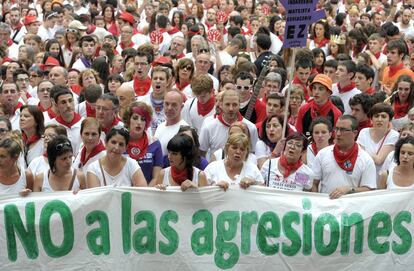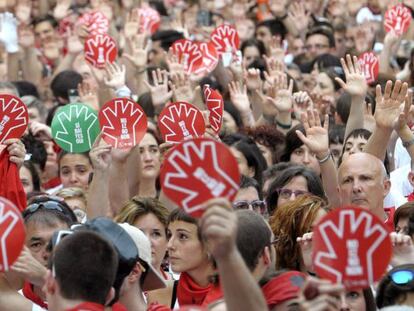Pamplona takes action to prevent sexual assaults at Running of the Bulls
City beefs up police presence after sharp rise in official complaints in 2016

Complaints related to sexual offenses increased fourfold at last year¡¯s Sanfermines, the world-famous ¡°Running of the Bulls¡± celebration held in Pamplona, northern Spain each July. And experts believe that many more cases go unreported.
In a bid to combat sexual abuse during the festival, which officially begins today at noon and ends at midnight on the July 14, police presence on the streets of the Navarrese capital has been beefed up with an 500 extra officers compared to 2016.
Around 3,500 members of the Spanish National Police, the regional police force and local law enforcement will be tasked with keeping the peace in a city whose population is expected to swell from 200,000 to one million over the next few days.
There are more reports because there is more support, but it is still the tip of the iceberg
Geno Otxando, Navarre Equality Institute
Most of the women who reported cases of abuse in the past were Spanish nationals who had come to Pamplona from other parts of the country. As for the assailants, there was a predominance of French nationals with no prior criminal record. As a result, members of France¡¯s Gendarmerie and National Police will also be patrolling the streets of Pamplona.
More patrols will be sent out to parts of the city with a higher record of sexual assault during past Sanfermines, notably the historical district of Casco Antiguo.
Five men from Seville are awaiting trial in the fall over their involvement in the gang rape of an 18-year-old woman in the early hours of July 7, 2016. It was the most serious of the 19 cases of sexual assault that were reported last year, and prosecutors are seeking a 22-year prison sentence for each one of them.
The 2008 murder of a young nurse named Nagore Laffage by a man with whom she refused to have sex shook Pamplona¡¯s society and triggered a citizen response to a reality that had gone largely ignored until then: the sexual abuse of women during the fiestas.

What began as activism by feminist groups became government policy in 2013, when the Navarre Institute for Equality (INAI) created a red-hand symbol representing the message ¡°No is no.¡± This is the slogan that is now widely seen on posters, flags, and stickers throughout the city.
¡°No is no, and a yes can become a no 10 minutes later if I don¡¯t like what¡¯s going on,¡± insists Geno Otxando, an official at INAI, who says that as a result of their campaign ¡°people now come out in defense of an assaulted woman and give her assistance.¡±
Police records show that, even as the population of Pamplona swells from 200,000 to a million, crime rates during the Sanfermines increase sixfold compared with the rest of the year. Around 90% of complaints involve theft. Eduardo Sainz de Murieta, the chief of criminal investigations at the regional force, the Polic¨ªa Foral, says that sexual crimes had not been a prime concern to date because the number of complaints averaged five every year, and generally not for assault (agresi¨®n), which entails the use of violence or intimidation, but for abuse (abuso), which does not.
But in 2016, the number of complaints multiplied by four. Besides the gang rape of July 7, another 18 women reported abuse and violent assault. Although he has no data to back it up, Sainz de Murieta believes that this spike is due to the fact that people are coming forward against behavior that used to be silenced.
¡°There are more reports because there is more support, but it is still the tip of the iceberg,¡± says Otxando, of INAI.
The regional police force has analyzed reports of sexual crimes at the Sanfermines since 2013, and found that 25% were classified as assault and 75% as abuse.
Sainz de Murieta also underscored that these crimes are typically perpetrated against victims who are all alone at the time of the attack, and who do not personally know their assailant.
English version by Susana Urra.
Tu suscripci¨®n se est¨¢ usando en otro dispositivo
?Quieres a?adir otro usuario a tu suscripci¨®n?
Si contin¨²as leyendo en este dispositivo, no se podr¨¢ leer en el otro.
FlechaTu suscripci¨®n se est¨¢ usando en otro dispositivo y solo puedes acceder a EL PA?S desde un dispositivo a la vez.
Si quieres compartir tu cuenta, cambia tu suscripci¨®n a la modalidad Premium, as¨ª podr¨¢s a?adir otro usuario. Cada uno acceder¨¢ con su propia cuenta de email, lo que os permitir¨¢ personalizar vuestra experiencia en EL PA?S.
?Tienes una suscripci¨®n de empresa? Accede aqu¨ª para contratar m¨¢s cuentas.
En el caso de no saber qui¨¦n est¨¢ usando tu cuenta, te recomendamos cambiar tu contrase?a aqu¨ª.
Si decides continuar compartiendo tu cuenta, este mensaje se mostrar¨¢ en tu dispositivo y en el de la otra persona que est¨¢ usando tu cuenta de forma indefinida, afectando a tu experiencia de lectura. Puedes consultar aqu¨ª los t¨¦rminos y condiciones de la suscripci¨®n digital.










































